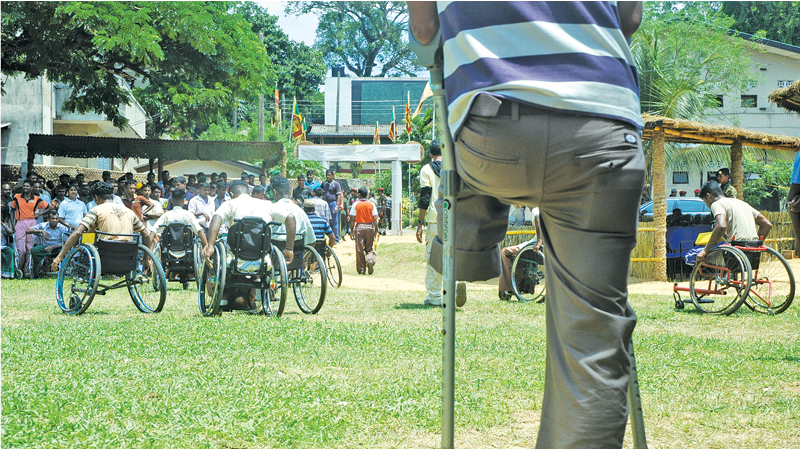Institute of Human Rights
Sri Lanka being signatory to many UN Conventions, Sri Lanka became a signatory to the United Nations Convention on the Rights of Persons with Disabilities on March 30, 2007 and ratified same on February 8, 2016. Article 28 (d) of UNCRPD - “to ensure access by persons with disabilities to public housing programmes”.
Sri Lanka has worked tremendously on the rights of persons with disability and formulated a National Policy on Disability, which was approved by the Cabinet in August 2003.
Protection of Rights of Persons with Disabilities Acts defines disability as “a person with disability means any person who, as a result of any deficiency in his physical or mental capabilities, whether congenital or not, is unable by himself to ensure for himself, wholly or partly, the necessities of life”.
Adequate housing
UN Covenant on Economic, Social and Cultural Rights states “the right of everyone to an adequate standard of living for himself and his family, including adequate housing”.
Issue of disability exists in every society. Persons with disability (PwDs) are constantly marginalized from the society on rights-based approach, and crippled mentally, socially and economically. Disability is a vast area which includes persons with physical and mental impairmentthat substantially limits their ability to carry out normal day-to-day activities.
Tsunami, prevalence of 30 year war and increased accidents are major factors that contribute to the increase number of PwDs population in Sri Lanka, in addition to the born with disabilities population.
Employment opportunities to the disabled are limited, thus making their economic situation more vulnerable and restricting opportunities to own a house. As per census of 2012, (a) 70% of people with disabilities are unemployed, (b) In Sri Lanka 8.7% of the total population above the age of 5 live with some form of disability (c) it was estimated that there are about 300,000 people in the age group of 18 - 60 have some disability and (d) out of the disabled population 57% are male and 43% are female.
PwDs are at an increased risk of becoming homeless and socially excluded due to the discrimination in access to services, inadequate housing and social supports, lack of accessible and affordable housing.
If disabled people are to have control over their lives, their housing needs have to be met in accordance to their disability. Every person with disability has some unique need to be considered when constructing houses. Right to public and private open spaces, right to interact with nature – right to natural light and fresh air are some of the common concerns.
Accessibility to schools, hospitals, transports etc. and other amenities are also to be considered, when crown lands are allocated to construct houses. Accessible housing for PwDs, will also need adaptations eg: wheelchair ramps, grab bars at risky areas such as bathroom and stair, to make their homes user friendly.
Disabled people can experience serious deterioration in their mental well-being due to living in unsuitable accommodation.
In Sri Lanka, houses/housing units for PwDs, accommodating all their requirements and adaptations need to be considered. Also there should be a mechanism to monitor the post-occupancy of the houses/housing units constructed for PwDs. This could be achieved by involving a Housing Occupational Therapist, across the whole process of construction and thereafter.
Housing projects
Inaccessible housing and programmes designed without consideration of the needs of persons with disabilities deprive the rights and benefits they should enjoy.
State with its limited resources has done much and the Ministry of Social Services provides Rs.250,000 to construct houses, with the objective to construct 100,000 housing units per annum nationwide until 2020. Unfortunately, we do not see specific number of houses/housing units allocated for PwDs.
Convention on the Rights of Persons with Disabilities report submitted by state parties under Article 35 (1) of the Convention indicate that “The Ministry of Housing, Construction & Cultural Affairs ensures that PwDs are not discriminated against in any of the housing projects conducted under the Ministry. In the housing projects scheduled for 2020, special consideration will be given to PwDs”.
Statistics indicate that only 14% of adults who have disability have ownership for houses. The pre-conditions for housing grant or loan, is that the individual should own a suitable block of land to build the house. Only 17% of individuals fulfil this requirement. State to give due consideration of converting the loan to grant, to ease the plight in re-paying the loan.
In the past many housing projects, such as model villages and scattered houses had been in progress. Under “Semata Sevana Viru Sumithru” programme, work commenced to construct 3,650 housing units to meet the housing requirements of war heroes who retired on being disabled.
It was aimed for housing for all in 2025. This should include the PwDs with low income and who cannot afford to own a house. Each person with an impairment has a varying degree of support needed from none to complex and multi-layered needs.
Sri Lanka’s commitment, by end 2020, implement a mechanism for participation of persons with disabilities to determine housing allocations for 3,200 identified low income families. Strategy to be implemented at national and local level to identify the beneficiaries, when implementing this commitment.
The national budgeting process should give its utmost consideration for allocation of funds to construct houses/housing units for PwDs with adaptations, so that they are not socially isolated. State and every citizen have a duty towards Rights of Persons with Disability, to provide them with a suitable accommodation. There is a dire need by the private property developers also, to contribute towards this worthy cause, and join hands with the state to make the lives easy for them, by allocating a reasonable proportion to meet the needs of PwDs, under “Corporate Social Responsibility”. This includes landless individuals with disabilities.
Let us work together to promote and protect the rights of our fellow citizens – PwDs security, by providing them with accessible dwelling to adopt their lives and take control over their lives.



Add new comment